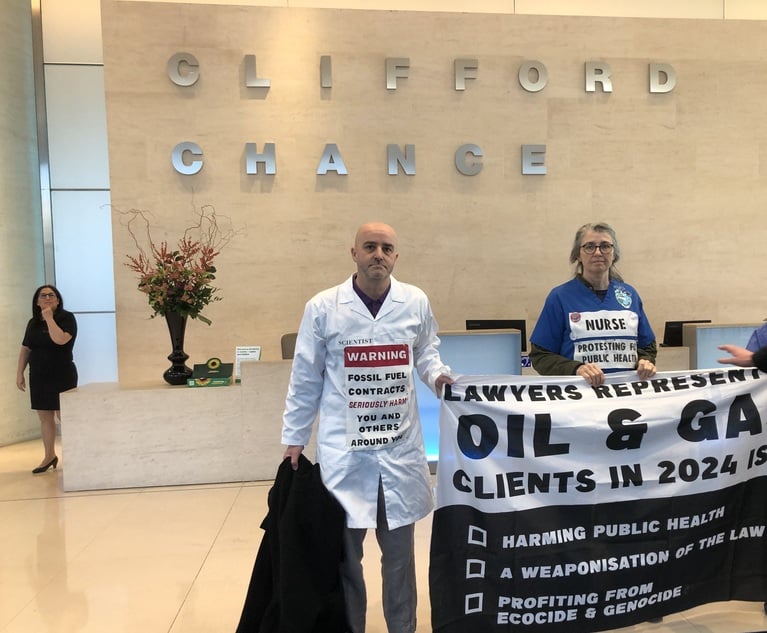 Meriam Al-Rashid (from left), Will O'Brien and John Lomas. (Courtesy photos)
Meriam Al-Rashid (from left), Will O'Brien and John Lomas. (Courtesy photos)Eversheds Hires US-based International Arbitration Team from Dentons
Partners Meriam Al-Rashid, Will O'Brien and John Lomas add international arbitration heft to Eversheds Sutherland's U.S. side—a priority for the trans-Atlantic firm.
March 05, 2020 at 01:01 PM
5 minute read
The original version of this story was published on Daily Report
Eversheds Sutherland has landed a team of international arbitration partners from Dentons as the trans-Atlantic firm builds its U.S.-side arbitration capabilities—a priority for growth.
The partners are Meriam Al-Rashid in New York, who has an investor-state dispute practice and also handles international human rights cases, along with Will O'Brien and John Lomas in Washington, D.C., where they practice international commercial arbitration.
Al-Rashid and O'Brien joined Eversheds Sutherland this week, while Lomas will join in the next few weeks, according to the firm.
Since the 2017 combination of the U.K.'s Eversheds with Atlanta-based Sutherland, Asbill & Brennan, a key goal of the firm has been to build up the U.S. side of its international arbitration practice, which is already well-established in London, said U.S. co-chair Mark Wasserman.
"We can help existing clients in a much bigger way with Meriam, John and Will being with us," he said.
"We have not had this practice in the United States and we've been looking for the right people for the better part of two years," Wasserman explained. "In today's global economy, international arbitrations are increasingly complex and strategically important for our clients—be they companies, investors or financial institutions."
The U.S. side of the firm does have practitioners handling international construction arbitration, including Jenny Fletcher and John Fleming in Atlanta—but it has not had anyone focused on investor-state disputes, like Al-Rashid, Wasserman said, or the broader commercial arbitration presence that O'Brien and Lomas bring in Washington.
Eversheds has about 80 lawyers worldwide who practice international arbitration, and in the past year it has added seven partners to the practice in Hong Kong, Singapore, the Middle East, London and Paris, said Ron Zdrojeski, the U.S. co-chair of the firm's global litigation practice.
"We're quite excited about having people of their caliber join us," Zdrojeski said. "The depth and diversity of their experience—which spans numerous regions, arbitral rules, deal types and industries—will greatly benefit our clients in need of sophisticated international dispute resolution."
The firm intends to add more U.S. practitioners to the international arbitration practice, Zdrojeski added.
|Breaking Into the Club
Al-Rashid, 41, who is leading the U.S. investor-state arbitration practice for Eversheds Sutherland, said she joined the firm for the chance to build a practice. "Eversheds had that gap in its U.S. international arbitration practice and presented me the opportunity," she said, adding that part of the draw was Eversheds Sutherland's commitment to developing a broad team of practitioners.
The firm also has clients across industries that engage in international dispute resolution and a strong litigation practice to support the arbitration team, Al-Rashid said, and she liked the people and the culture.
"The energy has been incredibly positive," she said, adding that some of the firm's London arbitrators have already been scheduling meetings for her to meet clients.
As a woman and minority, Al-Rashid said, she struggled hard to break into international arbitration. "It is a club and it is very hard to get into."
Al-Rashid, who is of Iraqi and Egyptian descent, holds citizenship in those two countries as well as the U.S. and the U.K., which she said is one reason she became interested in international dispute resolution.
After earning an LL.M. in international law from George Washington University she joined Crowell & Moring, where she started handling commercial arbitrations from its London office for clients in the Middle East and Central Asia.
Over time, Al-Rashid said, she started handling more arbitrations for investors against states. She left to become a partner at U.K. firm Pinsent Masons and then in 2016 joined Dentons to build that firm's international arbitration practice in the US, particularly for investor-state disputes.
Those disputes, often over ownership of oil, mining or other concessions, can be worth millions or even billions of dollars. For these cases, she said, "The stakes are high—and there will be a lot more disputes to come as we watch the geopolitics of the world change."
Among a long roster of cases, Al-Rashid has recently represented U.S. investors against Egypt over the country's expropriation of their cotton assets and a U.K. investor against Poland over the expropriation of a potash-mining project.
While Al-Rashid generally represents investors, often in disputes about oil, gas and mining assets or infrastructure projects like pipelines in developing countries, she has also represented states, such as Papua New Guinea, which was the defendant in a dispute over taxes on crude oil production. (The claimant paid the taxes, she said.)
Al-Rashid said her international human rights cases, many pro bono, are as important as her cases for commercial clients, adding that Eversheds Sutherland's support of pro bono was a draw.
In one recent case Al-Rashid analyzed and documented war crimes by Myanmar against the Rohingya people and then briefed why the killings should be classified as a genocide for the U.N. Human Rights Council, with the aim of starting an independent international investigation.
More than 730,000 Rohingya fled Myanmar in 2017 after a military-led crackdown that included mass killings and rape, but the country denies allegations of genocide.
Al-Rashid is working with the Vance Center for International Justice to advance the rights of children in Cite Soleil, one of the poorest districts in Port-au-Prince, Haiti. She is providing legal assistance to make a case that the conditions there are violations of the children's rights to a healthy environment, life and dignity.
This content has been archived. It is available through our partners, LexisNexis® and Bloomberg Law.
To view this content, please continue to their sites.
Not a Lexis Subscriber?
Subscribe Now
Not a Bloomberg Law Subscriber?
Subscribe Now
NOT FOR REPRINT
© 2024 ALM Global, LLC, All Rights Reserved. Request academic re-use from www.copyright.com. All other uses, submit a request to [email protected]. For more information visit Asset & Logo Licensing.
You Might Like
View All


Doctors and Scientists Lead Climate Protests at Each Magic Circle Firm

Law Firms Mentioned
Trending Stories
Who Got The Work
Michael G. Bongiorno, Andrew Scott Dulberg and Elizabeth E. Driscoll from Wilmer Cutler Pickering Hale and Dorr have stepped in to represent Symbotic Inc., an A.I.-enabled technology platform that focuses on increasing supply chain efficiency, and other defendants in a pending shareholder derivative lawsuit. The case, filed Oct. 2 in Massachusetts District Court by the Brown Law Firm on behalf of Stephen Austen, accuses certain officers and directors of misleading investors in regard to Symbotic's potential for margin growth by failing to disclose that the company was not equipped to timely deploy its systems or manage expenses through project delays. The case, assigned to U.S. District Judge Nathaniel M. Gorton, is 1:24-cv-12522, Austen v. Cohen et al.
Who Got The Work
Edmund Polubinski and Marie Killmond of Davis Polk & Wardwell have entered appearances for data platform software development company MongoDB and other defendants in a pending shareholder derivative lawsuit. The action, filed Oct. 7 in New York Southern District Court by the Brown Law Firm, accuses the company's directors and/or officers of falsely expressing confidence in the company’s restructuring of its sales incentive plan and downplaying the severity of decreases in its upfront commitments. The case is 1:24-cv-07594, Roy v. Ittycheria et al.
Who Got The Work
Amy O. Bruchs and Kurt F. Ellison of Michael Best & Friedrich have entered appearances for Epic Systems Corp. in a pending employment discrimination lawsuit. The suit was filed Sept. 7 in Wisconsin Western District Court by Levine Eisberner LLC and Siri & Glimstad on behalf of a project manager who claims that he was wrongfully terminated after applying for a religious exemption to the defendant's COVID-19 vaccine mandate. The case, assigned to U.S. Magistrate Judge Anita Marie Boor, is 3:24-cv-00630, Secker, Nathan v. Epic Systems Corporation.
Who Got The Work
David X. Sullivan, Thomas J. Finn and Gregory A. Hall from McCarter & English have entered appearances for Sunrun Installation Services in a pending civil rights lawsuit. The complaint was filed Sept. 4 in Connecticut District Court by attorney Robert M. Berke on behalf of former employee George Edward Steins, who was arrested and charged with employing an unregistered home improvement salesperson. The complaint alleges that had Sunrun informed the Connecticut Department of Consumer Protection that the plaintiff's employment had ended in 2017 and that he no longer held Sunrun's home improvement contractor license, he would not have been hit with charges, which were dismissed in May 2024. The case, assigned to U.S. District Judge Jeffrey A. Meyer, is 3:24-cv-01423, Steins v. Sunrun, Inc. et al.
Who Got The Work
Greenberg Traurig shareholder Joshua L. Raskin has entered an appearance for boohoo.com UK Ltd. in a pending patent infringement lawsuit. The suit, filed Sept. 3 in Texas Eastern District Court by Rozier Hardt McDonough on behalf of Alto Dynamics, asserts five patents related to an online shopping platform. The case, assigned to U.S. District Judge Rodney Gilstrap, is 2:24-cv-00719, Alto Dynamics, LLC v. boohoo.com UK Limited.
Featured Firms
Law Offices of Gary Martin Hays & Associates, P.C.
(470) 294-1674
Law Offices of Mark E. Salomone
(857) 444-6468
Smith & Hassler
(713) 739-1250






